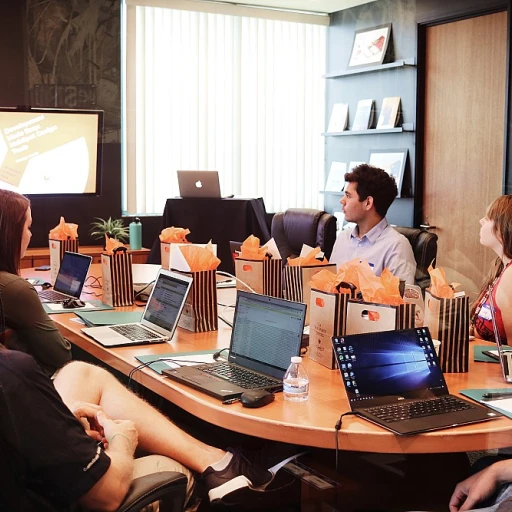
Understanding the Software Engineering Landscape
Grasping the Software Engineering Ecosystem
The world of software engineering is constantly evolving, characterized by rapid technological advancements and a variety of ever-changing frameworks. To effectively recruit in this domain, it's crucial for recruiters to have a sound understanding of the landscape. Software engineers are pivotal in driving innovation, and their skills are in high demand. They range from those proficient in full stack development to specialists in particular areas such as data science, machine learning, or blockchain. Keeping up-to-date with the latest trends in software development is essential for recruiters seeking top talent. The role of software engineers spans across multiple sectors—tech companies, finance, healthcare, and even entertainment rely on their expertise. This makes it critical for recruiting firms and development recruiters to be well-versed not only in the technical skills required but also in the specific industry demands. Understanding this complexity is a stepping stone in navigating the hiring process effectively. Additionally, the staffing landscape is filled with a mix of staffing agencies, executive search firms, and in-house recruiting teams, each with its unique processes and advantages. This competitive environment implies that recruitment strategies must be innovative and tailored to source and hire the best software talent successfully. Understanding this extensive and dynamic realm enables recruiters to identify suitable candidates who can not only fulfill the technical requirements but also mesh well with a company’s culture, thereby laying a solid foundation for long-term retention. For insights on formulating job titles that attract the right talent, refer to our guide on crafting effective job titles.Challenges Faced by Software Engineering Recruiters
Overcoming Obstacles in Engineering Talent Acquisition
Recruiting software engineers often poses unique challenges for companies. The complexities arise due to the highly competitive nature of the tech industry and the rapid evolution of technology. Engineering recruiters frequently find themselves navigating through various hurdles in order to fill crucial positions with the right software developer talents.
One of the fundamental challenges is the scarcity of qualified candidates. The demand for skilled software engineers surpasses the available supply, leading to intense competition among companies to secure top talent. Furthermore, the fast pace of software development amplifies the need for engineers who are not only proficient in current technologies but are also adaptable to future advancements.
Cultural fit is another vital aspect that can complicate the recruitment process. While technical expertise is pivotal, recruiters must ensure that candidates align with the company's values and work culture. Balancing these elements can be tricky, especially when trying to attract and retain engineers who are in high demand.
Moreover, the recruitment journey is often prolonged by the necessity of thoroughly evaluating technical skills. This process can involve multiple interviews, coding tests, and technical assessments, which can discourage potential candidates if not managed efficiently.
In tackling these challenges, companies might consider leveraging staffing agencies or recruiting firms with a focus on software engineering. Firms such as staffing agencies like CalTek Staffing or Nexus Group bring expertise in narrowing the search and attracting suitable candidates, saving valuable time and resources.
In conclusion, overcoming the challenges in recruiting software engineers necessitates a strategic approach that harmonizes technical evaluation, cultural compatibility, and efficient candidate engagement. By anticipating obstacles and employing effective staffing solutions, companies can better position themselves in securing top engineering talent.
Effective Sourcing Strategies for Tech Talent
Strategic Approaches to Discovering Tech Talent
Tech talent acquisition requires well-crafted strategies and a keen understanding of the landscapes. The process is not just about finding software developers; it involves uncovering the best software engineers who fit your company's culture and project requirements. In many companies, this role often falls within the expertise of dedicated staffing agencies and executive search teams. When venturing into talent searches, recruiters have various avenues at their disposal:- Networking and Referrals: Leveraging the power of your network can significantly aid the search for potential candidates. Networking within industry events and online tech communities allows you to identify engineering talent and draw insights from current employees.
- Online Talent Platforms: Websites like GitHub and Stack Overflow house a plethora of talented developers showcasing their work. Engaging on these platforms and tapping into open-source contributions can reveal candidates with strong coding skills.
- Academic Partnerships and Internships: Building relationships with universities and coding boot camps can create pipelines for new talent. Internships not only provide firsthand experience in assessing technical capabilities but also offer a trial run to evaluate cultural fit within the organization.
- Staffing Solutions Providers: Some organizations find success in collaborating with specialized staffing solutions and recruiting firms such as Nexus Group or Caltek Staffing, which bring expertise in sourcing tech-specific candidates effectively.
Evaluating Technical Skills and Cultural Fit
Assessing Technical Competence and Organizational Harmony
To effectively evaluate candidates for software engineering roles, recruiters need to adopt a dual approach focusing on technical skills and cultural fit. This cohesiveness is essential in navigating the final stages of the recruitment process and ensuring the effective integration of new hires into the team's work and organizational values. Technology plays a crucial role in streamlining this assessment phase. Recruiters today have access to sophisticated tools aimed at simulating real-world scenarios that test a candidate's technical prowess. Whether hiring a full stack developer, a software engineer, or candidates for niche engineering positions through staffing agencies such as the Nexus Group or CalTek Staffing, these tools enhance the precision of evaluations. They empower recruiting firms by automating coding assessments and skill validation. Recruiters should incorporate:- Automated Coding Assessments: Utilizing platforms that offer real-time coding challenges allows recruiters to gauge how candidates tackle coding tasks in a simulated environment, reflecting their potential contributions to software development projects.
- Project Portfolios: Encouraging candidates, especially software developers, to present a portfolio of their prior work enables recruiters to gain insights into their practical application of skills across various projects. This qualitative method helps in identifying top software talent.
- Behavioral Interviews: Conducting interviews that focus on a candidate's past experiences, problem-solving abilities, and team interactions offer recruiters a broader perspective of an individual's potential cultural fit.
- Team-Based Assessment: Inviting potential hires to work with current teams on trial projects provides insights into their interpersonal skills, adaptability, and synergy with existing staff.
Retaining Top Software Engineering Talent
Keeping Your Software Engineers Engaged and Loyal
Retaining top software engineering talent requires more than just offering a competitive salary. In a rapidly evolving industry, keeping engineers engaged and loyal is crucial for long-term success. Here are some effective strategies to consider:- Create Clear Career Pathways: Ensure that your software engineers have a clear understanding of their career progression within the company. This can involve outlining potential promotions, skill development opportunities, and leadership roles they can aspire to.
- Foster a Collaborative Work Environment: Engineers thrive in environments where they can collaborate with peers, share ideas, and work on innovative projects. Encourage teamwork and cross-functional collaboration to keep the creative juices flowing.
- Provide Continuous Learning Opportunities: Technology is ever-changing. Offering training and continuous learning opportunities can help your engineers stay up-to-date with the latest trends and tools in software development.
- Recognize and Reward Achievements: Recognition is a powerful motivational tool. Regularly acknowledge your engineering team’s efforts and achievements through bonuses, promotions, or simple public recognition.
- Maintain Work-Life Balance: Avoid burnout by promoting a healthy work-life balance. Implementing flexible working hours and remote work options can help retain your engineering staff in the long term.
- Implement Feedback Mechanisms: Regularly solicit feedback from your engineers on workplace satisfaction and areas for improvement. Using this feedback to drive change can make employees feel valued and heard.













